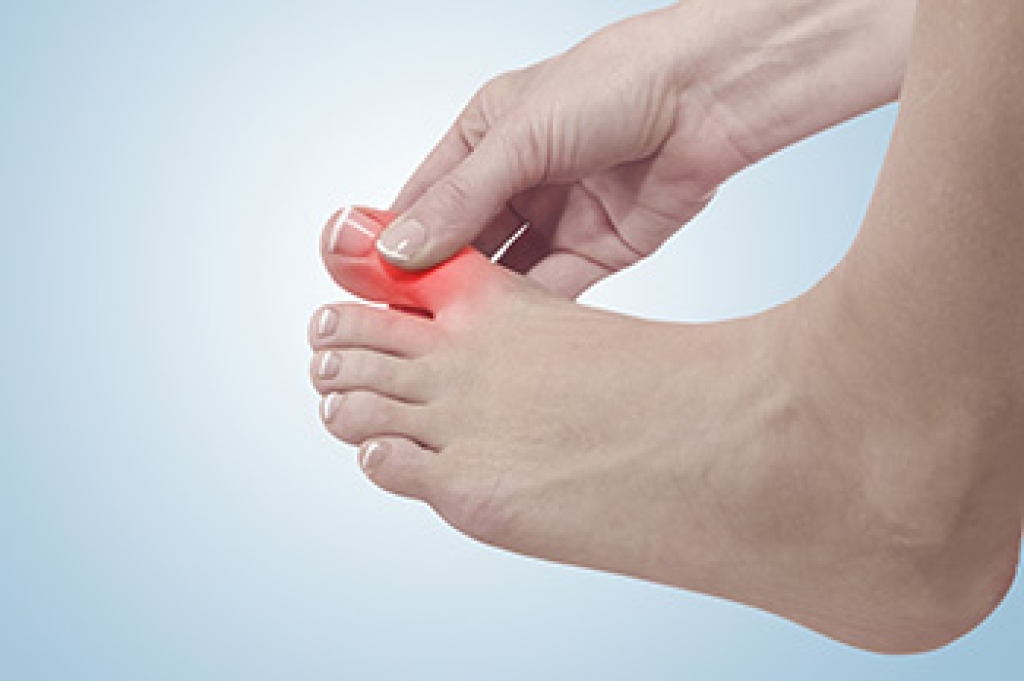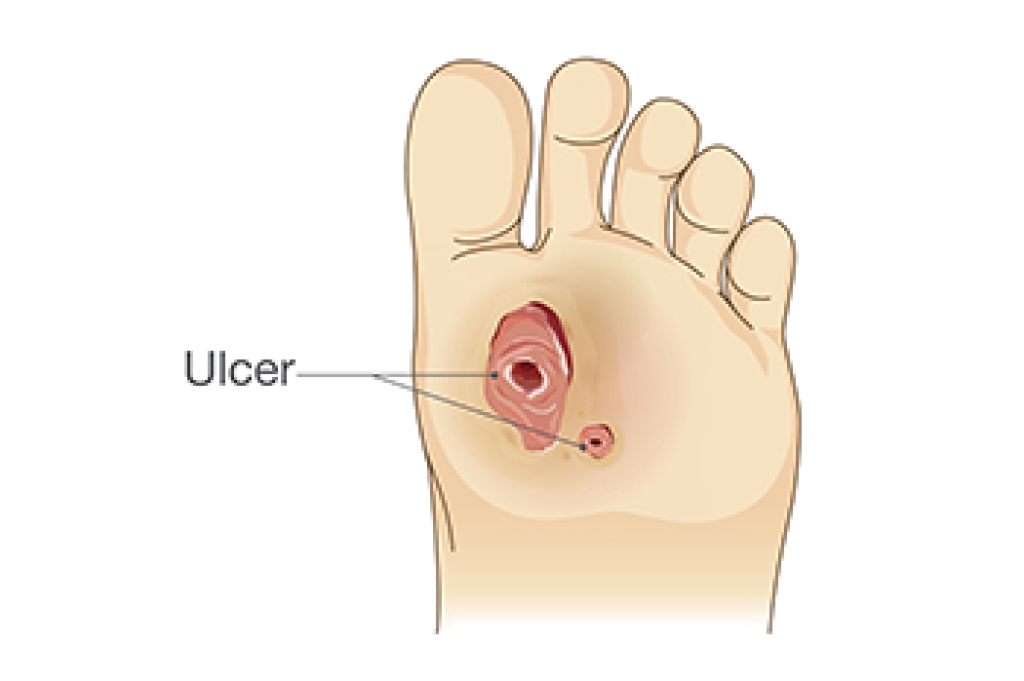Connect With Us
Blog
Blog
Sudden Joint Pain

Gout is a form of inflammatory arthritis that commonly affects the foot, especially the big toe, and often appears without warning. It is caused by a buildup of uric acid in the blood, which can form sharp crystals in the joints due to diet, genetics, dehydration, or certain medical conditions. Symptoms include intense pain, swelling, redness, and warmth that may develop overnight. The joint may look shiny, swollen, and inflamed, and it often feels extremely tender to the touch, making walking difficult. A podiatrist can help by starting with a detailed history and physical exam, supported by imaging or lab testing when needed to confirm the diagnosis. Treatment may progress to medication management, footwear guidance, dietary education, and strategies to reduce flare-ups. Early care can limit joint damage and improve mobility. If you have gout, it is suggested that you schedule an appointment with a podiatrist for effective relief and management tips.
Gout is a painful condition that can be treated. If you are seeking treatment, contact one of our doctors from New Jersey and New York. Our doctors will treat your foot and ankle needs.
What Is Gout?
Gout is a form of arthritis that is characterized by sudden, severe attacks of pain, redness, and tenderness in the joints. The condition usually affects the joint at the base of the big toe. A gout attack can occur at any random time, such as the middle of the night while you are asleep.
Symptoms
- Intense Joint Pain - Usually around the large joint of your big toe, and it most severe within the first four to twelve hours
- Lingering Discomfort - Joint discomfort may last from a few days to a few weeks
- Inflammation and Redness -Affected joints may become swollen, tender, warm and red
- Limited Range of Motion - May experience a decrease in joint mobility
Risk Factors
- Genetics - If family members have gout, you’re more likely to have it
- Medications - Diuretic medications can raise uric acid levels
- Gender/Age - Gout is more common in men until the age of 60. It is believed that estrogen protects women until that point
- Diet - Eating red meat and shellfish increases your risk
- Alcohol - Having more than two alcoholic drinks per day increases your risk
- Obesity - Obese people are at a higher risk for gout
Prior to visiting your podiatrist to receive treatment for gout, there are a few things you should do beforehand. If you have gout you should write down your symptoms--including when they started and how often you experience them, important medical information you may have, and any questions you may have. Writing down these three things will help your podiatrist in assessing your specific situation so that he or she may provide the best route of treatment for you.
If you have any questions, please feel free to contact our offices located in Little Silver, NJ and New York, NY . We offer the newest diagnostic and treatment technologies for all your foot care needs.
Care of Diabetic Foot Ulcers

Diabetes is a chronic condition that affects how the body regulates blood sugar and can lead to reduced circulation and nerve damage in the feet. One serious complication is a diabetic foot ulcer, which is an open wound that may develop due to pressure, injury, or unnoticed trauma. Proper care is essential to prevent infection and further damage. Treatment often includes carefully cleaning and disinfecting the wound, performing debridement to remove unhealthy tissue, and taking pressure off the foot to allow healing. Ongoing monitoring is critical for recovery. A podiatrist plays a key role by managing wound care, addressing pressure points, and guiding prevention strategies. If you have diabetes or notice a wound on your foot that is not healing properly, it is strongly suggested that you are under the care of a podiatrist who can help you manage this serious condition.
Wound care is an important part in dealing with diabetes. If you have diabetes and a foot wound or would like more information about wound care for diabetics, consult with one of our doctors from New Jersey and New York. Our doctors will assess your condition and provide you with quality foot and ankle treatment.
What Is Wound Care?
Wound care is the practice of taking proper care of a wound. This can range from the smallest to the largest of wounds. While everyone can benefit from proper wound care, it is much more important for diabetics. Diabetics often suffer from poor blood circulation which causes wounds to heal much slower than they would in a non-diabetic.
What Is the Importance of Wound Care?
While it may not seem apparent with small ulcers on the foot, for diabetics, any size ulcer can become infected. Diabetics often also suffer from neuropathy, or nerve loss. This means they might not even feel when they have an ulcer on their foot. If the wound becomes severely infected, amputation may be necessary. Therefore, it is of the upmost importance to properly care for any and all foot wounds.
How to Care for Wounds
The best way to care for foot wounds is to prevent them. For diabetics, this means daily inspections of the feet for any signs of abnormalities or ulcers. It is also recommended to see a podiatrist several times a year for a foot inspection. If you do have an ulcer, run the wound under water to clear dirt from the wound; then apply antibiotic ointment to the wound and cover with a bandage. Bandages should be changed daily and keeping pressure off the wound is smart. It is advised to see a podiatrist, who can keep an eye on it.
If you have any questions please contact our offices located in Little Silver, NJ and New York, NY . We offer the newest diagnostic and treatment technologies for all your foot and ankle needs.
Corns and When to Seek Podiatric Care

Corns are areas of thickened skin that develop as a response to ongoing friction and pressure on the feet. They commonly form on the tops and sides of toes or between toes where shoes rub repeatedly. Wearing tight footwear, abnormal toe positioning, and foot deformities are frequent causes that increase stress on the skin. There are different types of corns, including hard corns on bony areas and soft corns that appear between toes and may stay moist. Corns can be quite painful, especially when pressure is applied during walking or standing. A podiatrist can safely treat corns, relieve discomfort, and address the underlying cause. If you have developed a corn, it is suggested that you consult a podiatrist who can offer effective relief and treatment solutions.
If you have any concerns regarding your feet and ankles, contact one of our doctors of New Jersey and New York. Our doctors will treat your foot and ankle needs.
Corns: What Are They? and How Do You Get Rid of Them?
Corns can be described as areas of the skin that have thickened to the point of becoming painful or irritating. They are often layers and layers of the skin that have become dry and rough, and are normally smaller than calluses.
Ways to Prevent Corns
There are many ways to get rid of painful corns such as wearing:
- Well-fitting socks
- Comfortable shoes that are not tight around your foot
- Shoes that offer support
Treating Corns
Treatment of corns involves removing the dead skin that has built up in the specific area of the foot. Consult with Our doctors to determine the best treatment option for your case of corns.
If you have any questions, please feel free to contact our offices located in Little Silver, NJ and New York, NY . We offer the newest diagnostic and treatment technologies for all your foot care needs.
Metatarsophalangeal Joint Pain and Foot Health

Metatarsophalangeal joint pain refers to discomfort and inflammation in the joints where the toes connect to the foot, commonly affecting walking and balance. This condition often develops from overuse, abnormal foot mechanics, arthritis, wearing improper footwear, or repetitive stress on the forefoot. Symptoms may include aching or sharp pain, swelling, stiffness, tenderness, and difficulty pushing off while walking. Pain may worsen with activity or prolonged standing. A podiatrist can evaluate foot structure, identify the underlying cause, and recommend personalized treatment options such as supportive footwear, custom orthotics, activity modification, and targeted therapies to relieve pain and restore function. If forefoot pain is limiting your mobility or comfort, it is suggested that you schedule an appointment with a podiatrist who can provide a personalized plan for treatment and relief.
Foot Pain
Foot pain can be extremely painful and debilitating. If you have a foot pain, consult with one of our doctors from New Jersey and New York. Our doctors will assess your condition and provide you with quality foot and ankle treatment.
Causes
Foot pain is a very broad condition that could be caused by one or more ailments. The most common include:
- Bunions
- Hammertoes
- Plantar Fasciitis
- Bone Spurs
- Corns
- Tarsal Tunnel Syndrome
- Ingrown Toenails
- Arthritis (such as Gout, Rheumatoid, and Osteoarthritis)
- Flat Feet
- Injury (from stress fractures, broken toe, foot, ankle, Achilles tendon ruptures, and sprains)
- And more
Diagnosis
To figure out the cause of foot pain, podiatrists utilize several different methods. This can range from simple visual inspections and sensation tests to X-rays and MRI scans. Prior medical history, family medical history, and any recent physical traumatic events will all be taken into consideration for a proper diagnosis.
Treatment
Treatment depends upon the cause of the foot pain. Whether it is resting, staying off the foot, or having surgery; podiatrists have a number of treatment options available for foot pain.
If you have any questions, please feel free to contact our offices located in Little Silver, NJ and New York, NY . We offer the newest diagnostic and treatment technologies for all your foot care needs.
Blog Archives
- 2026
- 2025
- 2024
- 2023

